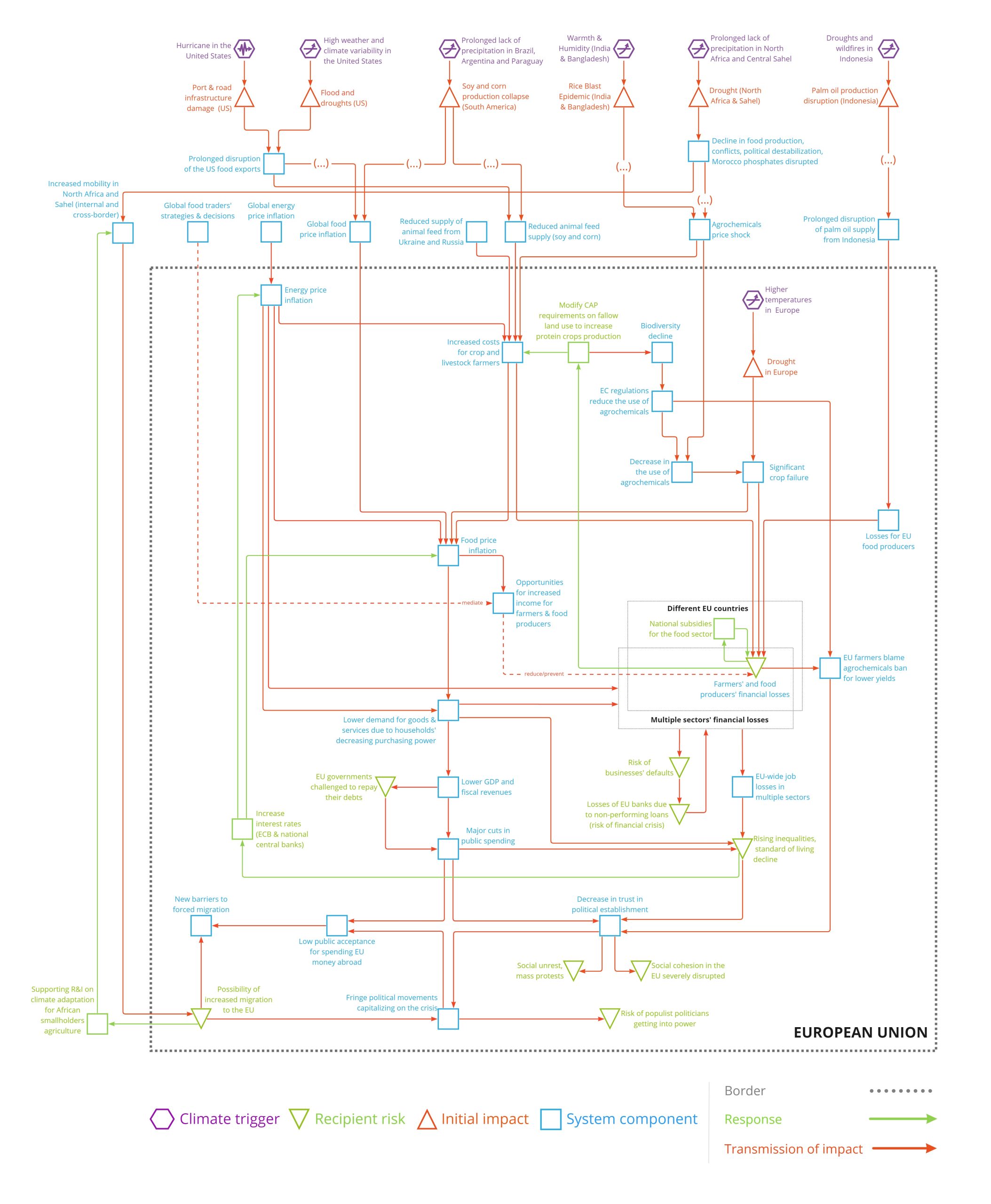
The workshop was an opportunity to bring CASCADES’ research to stakeholders – coming from the public, private and third sectors – for consultation.
As in previous Stakeholder Workshops, the consultation began with a Policy Simulation session that was run by the Centre for Systems Solutions.
Policy Simulation
This time around, participants took on the roles of various representatives in the fictional European Food Taskforce, and discussed responses to an unfolding food crisis, set in 2026. As representatives of governments, EU institutions, businesses and NGOs, they worked together in one of three thematic Working Groups: 1) Trade, Supply and Value Chains, 2) Foreign Policy, Security, and Development, and 3) Finance and Business. In each group, participants were faced with challenging scenarios of cascading crises, triggered by extreme climate events. Together, they drafted ideas for policy instruments that could limit or mitigate the negative rippling effects presented in these scenarios, as well as build greater resilience into the system at large.
On average, each group came up with 8 policy propositions. The policies were related to: recognizing the need for commitment to open trade, strengthening the resilience of value chains, promoting local solutions and regeneration schemes, investing in sustainable agriculture, introducing a global tax on windfall profits of agriculture traders, and more.
The Policy Simulation was a learning experience in which stakeholders confronted plausible, evidence-informed scenarios, and experienced the pressures and chaos arising from multi-stakeholder negotiations in a crisis and fast-paced policy development. The goal was to sensitize stakeholders to the interconnections and vulnerabilities of the global food system, and to the costs of working in silos, while emphasizing the importance and feasibility of collaboration.
Many participants commented – in their feedback on this session – that the simulation helped them see the complexity of global governance systems and the need to apply a systemic approach to the policy development process.
Developing Policy Responses
The second part of the workshop started with an overview of the CASCADES conceptual framework (see below). It was followed by work in breakout groups, in which participants were asked to establish major food system risks for the EU that were missing from the diagram, and the most effective policies to address these risks. After identifying additional potential risks that were not included in the CASCADES conceptual framework diagram, stakeholders shared their suggestions regarding possible policy responses that can be implemented to prevent future food crises and related spillover effects.

Stakeholders shared that outside of the CASCADES conceptual framework diagram, scientists and policymakers need to consider more broadly cascading climate impacts on the natural environment, trade, political and social systems.
They emphasized the need for broader investigation into environmental impacts, such as sea level rise (on loss of lands) or pests and diseases (not only on yield outcomes, but also on the nutritional value of crops). In terms of implications for trade, the value and supply chains need to be further analyzed. CASCADES’ stakeholders also stressed that we need to consider how certain trade restrictions will affect the EU’s dominance on the global food market. When it comes to political implications, participants raised concerns regarding the overall potential impacts on democracies (e.g., rising crime rates or nationalist and protectionist movements), as well as geopolitical and monetary instability.
Lastly, we need to consider certain implications on the social fabric – where, for example, some groups might perceive food security as an elite project even though it affects and requires the support of civil society at large. Some stakeholders mentioned the lack of debate on channeling empathy into policymaking processes, which might limit new discourses on how global crises (e.g., food crisis) are handled.
Amongst other ideas, participants highlighted the need for a global system approach and the creation of a “Food Security Platform” for international cooperation on food security. There was also a suggestion to enhance and define financing mechanisms, especially when it comes to crisis prevention (e.g., a framework for protecting farmers and other involved parties).
Adding to that, estimations and pricing of cascading climate impacts might be useful mechanisms to boost the effectiveness of the policies. Some participants also commented that there is a need for a strategy to decarbonize agriculture, as well as diversify the trade and value chains to build resilience to shocks.
All breakout groups mentioned the need for capacity building through information campaigns and incentives for behavioral change (of consumers and producers), in order to change perceptions regarding the most effective methods. Last but not least, stakeholders pointed out that it may be useful to streamline existing policy responses by redefining “sustainability”, to switch it from a buzzword to a policy-relevant term.
All in all, the final CASCADES Stakeholders Workshop was yet again an engaging showcase of the cascading effects of climate change (both direct and indirect) and the complexity of interactions taking place in a globalized market, and world in general. The CASCADES project will build on this Workshop during the next year to deliver final conclusions in June 2023.



